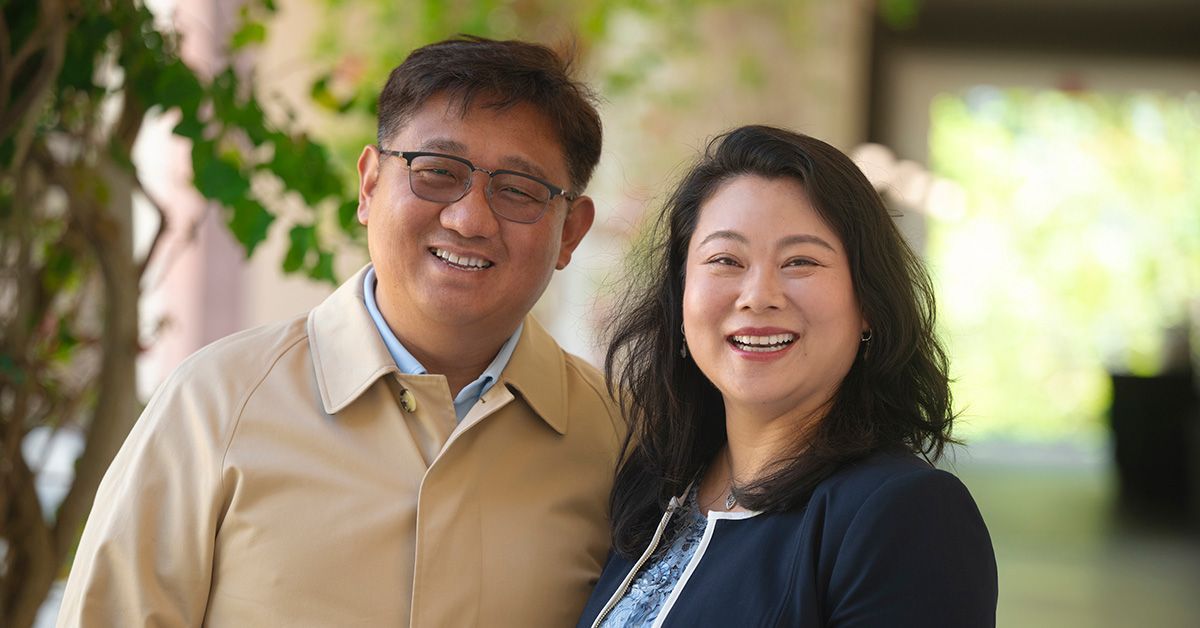$21 Million Gift to UC San Diego Honors Unique Efforts to Link Chemical and Nano Engineering More Strongly
Invigorated with a $21 million gift from the Li family, UC San Diego’s newly named Aiiso Yufeng Li Family Department of Chemical and Nano Engineering is unique for its efforts to combine nano-scale discovery, nano-scale engineering and manufacturability driven by advances in chemical engineering
Story by:
Published Date
Story by:
Topics covered:
Share This:
Article Content
A new $21 million gift from San Diego-based business leader and philanthropist Aiiso Yufeng Li (Jeff) and his wife, DongDong Li (Doreen), honors unique efforts at the University of California San Diego to link chemical and nano engineering more strongly – in education and research. In recognition of this gift, the department that houses UC San Diego’s chemical and nano engineers will be named the Aiiso Yufeng Li Family Department of Chemical and Nano Engineering.
This transformative gift is one half of two independent milestones for the world-renowned nano engineers and chemical engineers at the UC San Diego Jacobs School of Engineering.
First, to reflect the department’s longstanding efforts to link its existing strengths in chemical and nano engineering more strategically, the engineering terminology in the department name has changed from “NanoEngineering” to “Chemical and Nano Engineering.”
Second, these longstanding efforts at UC San Diego to better link chemical engineering and nano engineering inspired Jeff, a nanoengineer, entrepreneur and philanthropist, and his wife Doreen and their family, to pledge $21 million in support of chemical and nano engineering in the Jacobs School of Engineering.
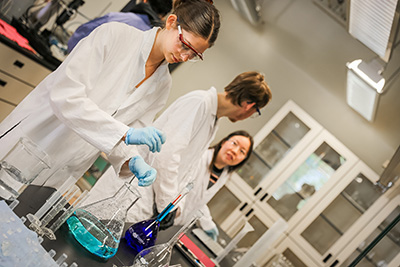
The Li family’s gift will support education and research initiatives aimed at strengthening the ties between the two fundamentally complementary disciplines of chemical engineering and nano engineering within the department. The largest two research focus areas within the department are nanomaterials for human health, and nanomaterials for sustainable energy.
“UC San Diego is proud to be at the forefront of engineering innovation, and the Aiiso Yufeng Li Family Department of Chemical and Nano Engineering is a testament to our commitment to pushing boundaries and driving progress,” said Chancellor Pradeep K. Khosla. “By combining these two fields, we are poised to unlock new discoveries that will improve lives and transform industries. We are deeply grateful to Jeff and Doreen for their visionary support, which will accelerate our pursuit of breakthroughs and cement UC San Diego’s position as a global leader in engineering education and research.”
Longstanding efforts to link Chemical and Nano Engineering
“Here at UC San Diego, we have a critical mass of faculty in the department whose research inherently includes strengthening the connections between chemical engineering and nano engineering. Our faculty have a desire to make real-world positive impacts by advancing medicine or improving renewable-energy technologies that drive our efforts as researchers to connect nano-scale engineering and chemical engineering in new ways,” said Liangfang Zhang, professor and department chair of the Aiiso Yufeng Li Family Department of Chemical and Nano Engineering at the UC San Diego Jacobs School of Engineering. “I am incredibly thankful for the generous gift from the Aiiso Yufeng Li Family. Their vote of confidence will allow us to accomplish our trailblazing vision to redefine chemical and nano engineering research and education more rapidly and more comprehensively.”
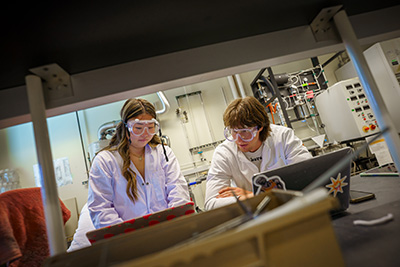
It is this transformative vision linking chemical and nano engineering that captured the attention of Jeff, who is the founder and chief strategy officer (CSO) of CorDx, a global biotech company and leader in the inventing and manufacturing of in vitro diagnostics.
“I am inspired by the department’s vision to unite the disciplines of chemical engineering and nano engineering more fully, with the ultimate goal of benefiting humanity,” said Jeff. “A large part of our success at CorDx can be traced back to our desire and ability to integrate nano-scale science and engineering with chemical engineering. I believe this convergence of nano-scale engineering and chemical engineering represents a bright future for manufacturing in the U.S. When I saw so many faculty in the UC San Diego Jacobs School of Engineering connecting chemical and nano engineering while making research advances, training students and launching startups, I felt even more connected to the university. My family and I are proud to support UC San Diego on its journey to shape the next generation of scientists and engineers by building bridges between chemical and nano engineering. When I say ‘family,’ of course, I am referring to both my biological family and my CorDx family.”
Relevant, interdisciplinary research
In 2007, UC San Diego created the Department of NanoEngineering, which brought together new degree programs and emerging research efforts in nanoengineering with existing degree programs and research efforts in chemical engineering. This initiative was driven by the fact that nanotechnology had become an important academic subject both in terms of education and research. At the same time, a wide range of industries expressed growing nanotechnology workforce needs. Aiming to bridge the gap between nanoscale discovery and scalable production and manufacturing, the university integrated its chemical engineering degree programs and research into the nanoengineering department.
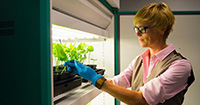
Over the next 17 years, this visionary plan has enhanced the translation of nanoscale research into a wide range of practical applications.
Since that time, the department has made significant strides through interdisciplinary research that links experts from diverse fields, including chemical engineering, nanoengineering, materials science, biomedical engineering, chemistry, physics, biology, medicine and more.
This interdisciplinary culture has catalyzed a diverse array of collaborative research projects that integrate fundamental science with applied research – often related to scaling up of advances in order to enable real-world use. Broadly speaking, the department’s research strengths are in nanoscale materials and technologies for healthcare and renewable energy.
“The research in our department is quite varied, but when I’m describing our work to prospective students, faculty candidates or external collaborators, I highlight the fact that we have extremely strong and broad research strengths in two general areas that are of great importance to society at large: in nanoscale science and engineering to improve health and medicine; and in the creation, characterization and improvement of nanoscale materials for solar panels, batteries and other technologies that help to generate, capture or store renewable energy,” said Zhang, who holds the Joan and Irwin Jacobs Chancellor's Endowed Chair Professor at UC San Diego.
Discoveries and applications
“What sets our faculty apart is their inherent understanding that fundamental research and real-world application are not mutually exclusive, but synergistic. Our world-class chemical and nano engineering faculty approach their work with a mindset that their fundamental discoveries hold practical use and clinical potential. This is how we are driving forward innovation and impact in our field,” said Zhang.
It is through this aspect of the department’s research and education endeavors that Jeff – the nanoengineer, entrepreneur and philanthropist – was reminded of his own company’s journey from nanoscale discovery to large-scale production. His company, CorDx, stands as a noteworthy example of integrating nanoengineering and chemical engineering, from initial research on molecules and materials to the design and manufacturing of innovative diagnostic products, such as the CorDx TyFast Flu A/B & COVID-19 At Home Multiplex Rapid Test, capable of detecting Flu A, Flu B and COVID-19 simultaneously.
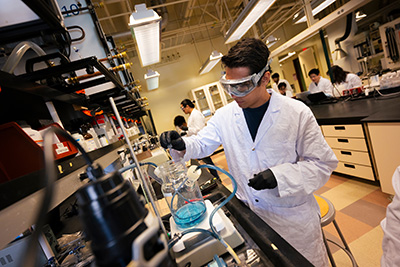
Improving educational and career opportunities
Many UC San Diego students at all levels – undergraduate, masters and doctorate – will benefit from these closer ties between chemical engineering and nano engineering. The Li family’s gift will offer concrete support to all student organizations in the department, enhancing both their curricular and extracurricular experiences.
Nano engineering undergraduates, for example, are now encouraged to take chemical engineering classes as electives. This allows them to engage in discovery-oriented research while learning how to scale up those discoveries and turn them into products.
Meanwhile, chemical engineering students who are learning about large-scale production and manufacturing processes are highly encouraged to take classes on fundamental nanoscience, fabrication and characterization techniques, which opens new ways to make use of their chemical engineering expertise.
Masters students in both chemical engineering and nano engineering at UC San Diego have truly unique opportunities to build upon their undergraduate degrees and create compelling professional opportunities in a wide range of industries including biotechnology, drug development and renewable energy.
Doctoral students will be fully engaged in research environments that are unique in the world and will lead to a wide range of career opportunities.
“Our chemical and nano engineering department equips our students with a comprehensive understanding of both disciplines, and this sets us apart from other chemical engineering departments in the nation,” said Albert P. Pisano, Dean of the UC San Diego Jacobs School of Engineering and Special Adviser to the Chancellor. “By integrating chemical and nano engineering coursework, we are providing students with a unique skill set that will make them better prepared for their future careers. This is our longstanding vision, and I am thrilled and honored to add my thanks to Jeff, Doreen and the entire family. Our department will have new, game-changing resources to improve the experiences of our students as they move through our career-accelerating degree programs at all levels.”
A sampling of nanomedicine research in the department
A wide range of health-related research led by chemical engineers and nano engineers is powered by nano-scale research advances. Below are just a few examples.
-
Treatment based on nanoparticles derived from plant viruses shows promise in fighting metastatic cancers in mice
-
“Plug and play” nanoparticles could make it easier to tackle various biological targets
-
Biodegradable polymer system offers new hope for treating rheumatoid arthritis
-
Wireless, wearable ultrasound monitoring is advancing through innovative collaborations
-
A new technique creates greater fidelity in bioprinting functional human tissues
-
Targeted drug delivery using microscopic robots to treat deadly pneumonia and other hard-to-treat infections
-
Advancing predictive assembly and living materials, powered by a prestigious $18 million NSF Materials Research Science and Engineering Center (MRSEC).
A sampling of renewable energy research in the department
A wide range of battery and solar panel research tied to the UC San Diego Sustainable Power and Energy Center (SPEC) is powered by nano-scale research advances:
-
A novel anode material to build lithium-ion batteries capable of ultra-fast charging and extended lifespan
-
An eco-friendly process to restore spent battery materials to mint condition
-
A predictive database that uses AI to discover new materials for safer and more energy-dense batteries
-
The discovery of nano-scale changes inside solid-state batteries could lead to improved solid-state battery performance
-
The use of advanced microscopy to probe inside perovskites at the nanoscale level and elucidate mechanisms of degradation of perovskite solar cells
-
Work to strengthen the battery ecosystem in San Diego through startups and workforce development.
Related gifts to the Jacobs School
The generosity of the Li family represents more than $26 million in philanthropic support to the UC San Diego Jacobs School of Engineering since 2021.
Gifts have included a $2.1 million gift to support research, education and student activities in the Department of NanoEngineering and a $3 million donation to boost the Jacobs School’s Sustainable Power and Energy Center (SPEC).
In addition, Li donated $210,000 in seed funding to the UC San Diego Department of Bioengineering in 2021. The gift played a key role in building momentum for the department, which was later renamed the Shu Chien-Gene Lay Department of Bioengineering thanks to a generous gift from Gene Lay. The seed funding is also helping to unlock additional resources to upgrade hands-on bioengineering teaching laboratories.
“We are deeply grateful to Jeff, Doreen and their entire family and community for their generosity, vision and support,” said Pisano. “Their recent philanthropic support for our efforts to advance sustainable energy innovation through our Sustainable Power and Energy Center and to strengthen chemical and nano engineering efforts are deeply meaningful and will yield incredible results in their own right.”
 LEARN MORE ABOUT HOW YOU CAN SUPPORT UC SAN DIEGO »
LEARN MORE ABOUT HOW YOU CAN SUPPORT UC SAN DIEGO »
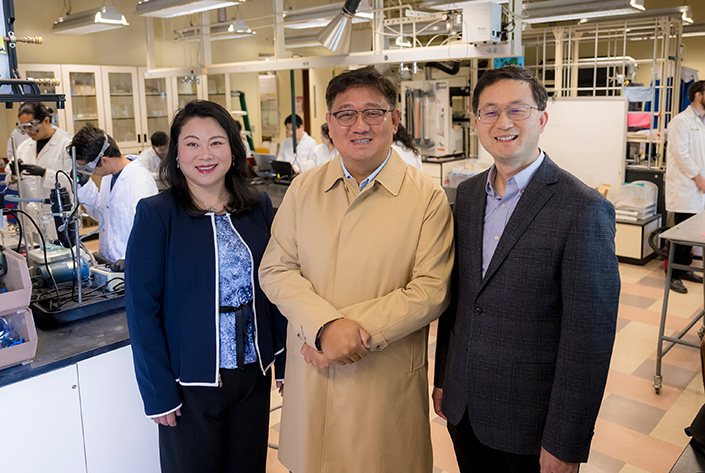
Stay in the Know
Keep up with all the latest from UC San Diego. Subscribe to the newsletter today.
